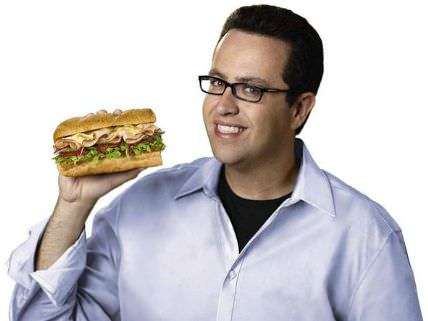Why Is Jared Fogle's Viewing of Naked Teenagers a Federal Case?
The arbitrary decision that greatly magnified the penalties he faces

Yesterday I noted the big gap between state and federal penalties for the offenses that Jared Fogle is accused of committing. While he might have received a sentence as short as two years for the child pornography offenses under Indiana law, he faces at least five years under federal law and perhaps much longer: The maximum federal penalty for receiving or distributing child porn is 20 years, and the maximum penalty under his plea deal is 12 and a half years.
Similarly, the charges against Fogle say he had sex with a 17-year-old prostitute at two New York City hotels. Since 17 is the age of consent in New York, the only state crime he committed on those occasions seems to be patronizing a prostitute, a Class A misdemeanor punishable by up to a year in jail. Fogle's plea agreement reportedly also mentions sex with a 16-year-old prostitute, which under New York law could be treated as rape in the third degree, a Class E felony punishable by anything from probation to four years in jail. But under federal law, the same sex acts can be punished by up to 30 years in prison.
Given the potential penalties under federal law, it's not surprising that Fogle reached a plea agreement. But you may wonder: Why was this a federal case at all? The short answer is that federal prosecutors decided it should be, possibly because they knew a case involving the famous Subway pitchman would make a big splash. The longer answer is not much more satisfying.
Although Fogle's possession and sharing of child pornography seems to have taken place entirely within the borders of Indiana, prosecutors say his "distribution and receipt of images or videos was accomplished using a means or facility of interstate or foreign commerce, and in or affecting interstate or foreign commerce." How so? The charges say Fogle looked at child pornography produced by his associate Russell Taylor, who ran his charitable foundation, "on a computer provided by Taylor." Taylor also allegedly gave Fogle "commercial child pornography" on a thumb drive. Not interstatey enough for you? Well, Fogle also "received some images and videos through text messages," delivered via a cellphone network that operates across state lines.
Still not satisfied that federal jurisdiction is appropriate? Perhaps it bothers you that Fogle's "distribution" of child pornography consisted of "one occasion" when he "displayed to another person the commercial child pornography he obtained from Taylor on a thumb drive," which does not seem to involve interstate commerce in any way. In case you harbor such doubts, here's the clincher: "The visual depictions the Defendant distributed and received were produced using camera equipment, computers, cell phones, and storage media manufactured outside the State of Indiana." Enough said.
The federal nexus for the prostitution-related charges is straightforward by comparison. Although none of the sex Fogle had crossed state borders, Fogle himself did while traveling to New York City so he could pay to have sex with teenagers. Under 18 USC 2423, "a person who travels in interstate commerce…for the purpose of engaging in any illicit sexual conduct with another person shall be fined under this title or imprisoned not more than 30 years, or both." Just in case, the statement of charges also notes that Fogle "repeatedly engaged in Internet social networking…for the purpose of engaging in commercial sexual activity"; that he "did this using an Internet email account, social networking websites containing advertisements for escorts or erotic services, online messaging services, and text messages"; and that "all of these activities used facilities of interstate or foreign commerce."
The invocation of federal jurisdiction and the much harsher penalties that come with it seems especially arbitrary given the nature of the child pornography produced by Taylor and viewed by Fogle. The statement of charges says the 12 minors involved, who ranged in age from 9 to 16 (although the youngest seen by Fogle was 13 or 14), "did not know that they were being secretly filmed in Taylor's current and former residences." Rather, "the images or videos were produced using multiple hidden cameras concealed in clock radios positioned so that they would capture the minors changing clothes, showering, bathing, or engaging in other activities." That is obviously an outrageous violation of privacy and breach of trust, all the more disturbing because of the sexual pleasure that Taylor and Fogle presumably got from viewing these images. But the production of this voyeuristic material did not involve the sexual assault of children, which would have made the crime much worse.
Prosecutors rightly fault Fogle for failing to report Taylor, saying, "If the Defendant had promptly reported to law enforcement what he knew of these activities, then the sexually explicit material involving later victims would not have been produced." Instead Fogle viewed the material, "made comments approving of this activity," and possibly encouraged Taylor to continue. That, it seems to me, is the essence of his crime, and it should not be dismissed. But I don't think it's worthy of five years in prison, the minimum that Fogle will serve, let alone 12 and a half years, the maximum that prosecutors can seek under the plea deal. Those are similar to Indiana's penalties for sexually assaulting a child, something neither Fogle nor Taylor is accused of doing.


Show Comments (50)